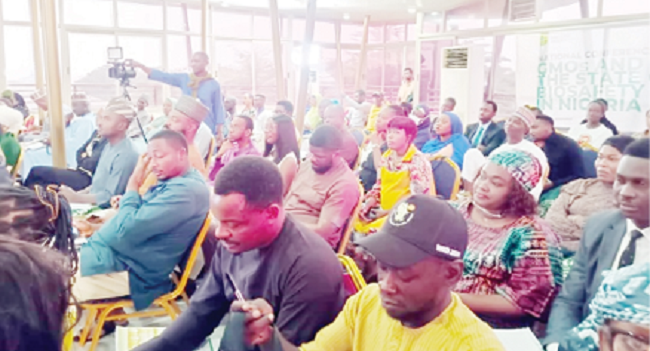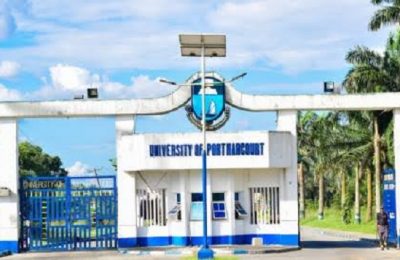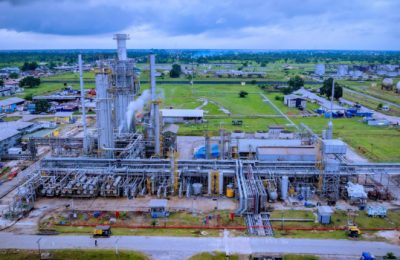Nature-based organisation, Health of Mother Earth Foundation (HOMEF) and stakeholders under the Genetically Modified Organisms (GMO)-Free Nigeria Alliance, have taken a critical look at the introduction of genetically modified crops into the country by the National Biosafety Management Agency (NBMA) and have called for an outright ban on GMO crops otherwise called GMOs in Nigeria.
At a multi-stakeholder national conference held in Abuja, the organisations brought affected stakeholders together to address the various concerns regarding biosafety and particularly GMOs, review the experience so far; and come up with clear resolutions regarding their release and use as well as solutions for food sovereignty in Nigeria.
According to a communique issued at the end of the conference, it was noted that since the setup of the National Biosafety Management Agency (NBMA) Act in 2015, more than 20 different crop varieties have been approved by NBMA for various purposes, including commercial release/market placement. As of June 28, according to information available on the Biosafety Clearing House (where countries that are signatories to the Biological Convention on Biodiversity are required to upload information regarding decisions on GMOs), Nigeria has approved 25 genetically modified (GM) products – 11 for field trials; for commercial release; and 10 for food, feed and/or processing. The last updated information on the BCH website as of June 28, is from the decision made in April 2023, which was uploaded on December 31, 2023. Information regarding these decisions/approvals is not available on the website of the NBMA.

According to HOMEF, these approvals were given without regard for objections (based on scientific analyses) by HOMEF and other organisations representing millions of Nigerians.
There are key concerns with the deployment of GMOs in Nigeria, including the faulty regulatory architecture, lack of evidence of unbiased risk assessment conducted; poor/no access to information, health and environmental hazards, as well as economic implications threatening food security.
Since the most recent approval of TELA Maize which is genetically modified to be pest resistant and drought tolerant, there has been an uproar of concerns in the country.
Major concerns expressed by the public include the secrecy with which these GMOs are deployed, the implication of corporate control of seeds on the Nigerian food system, the contamination of the country’s local genetic resources, environmental degradation, health implications and more.

In May 2024, the House of Representatives adopted a motion to probe the introduction of GMOs in Nigeria and urged the Federal Government to suspend introduction of new GMO crops in the country.
According to GMO-Free Nigeria Alliance HOMEF, “this is a laudable decision, one that must be followed up to ensure that the investigation process is unbiased and that the concerned agencies have all the relevant information on which to base their recommendations.”
The organisations also noted that firstly, “in almost 30 years since the introduction of GMOs, they haven’t solved the problem of hunger in countries where they have been deployed or in the world. There is no evidence of a country which has eradicated food insecurity using GMOs.”
Secondly, they stated that, “GMOs are mostly driven by greed and profit maximisation rather than the need to address hunger or food insecurity. Currently, this technology is dominated by a small number of corporations. Four companies control 60 per cent of the global seed supply: Bayer (merged with Monsanto), Corteva, ChemChina and Limagrain. These companies engage in the development and patenting of genetically modified (GM) seeds.
Thirdly, “There is significant linkage of consumption of GMOs with several health and environmental implications including cancers, mental health disorders, immune disorders as well as loss of nutritional and biological diversity.”
The organisations went on to demand that “the Nigerian people – farmers, researchers, civil society organisations, faith-based organisations, academia, women and youth demand an outright ban on GMOs and a preservation of Nigeria’s indigenous seeds and food system.”
They also demanded that the NBMA be urgently reviewed to address existing loopholes including the conflictive composition of the NBMA Board, absence of provision on strict liability, poor attention to the precautionary principle, the discretionary provision on risk assessment, power to receive gifts, and so on.
Other demands include that “The NBMA should produce for peer review, results of risk assessments conducted prior to the approval and commercial release of GMOs in Nigeria.
“The Nigerian government should ensure improved support for small holder farmers who are actually feeding the country.
“The Federal Ministry of Agriculture and Food Security should invest in and promote the adoption of an agroecological system of farming which is proven to assure increased food productivity, diversify income for farmers, recover degraded soils, increase biological and nutritional diversity, mitigate climate change and its impact and ensure food sovereignty for Nigeria.
“The House of Representatives Committee on Agriculture and Services and the Committee on Health and on Environment should ensure an independent and long-term research on GMOs and biosafety as was announced in May 2024.”
“The Federal Ministry of Agriculture and Food Security should invest in and promote the adoption of an agroecological system of farming which is proven to assure increased food productivity, diversify income for farmers, recover degraded soils, increase biological and nutritional diversity, mitigate climate change and its impact and ensure food sovereignty for Nigeria.”
Read Also: NELFUND, Kebbi govt partner to expand student loan access







